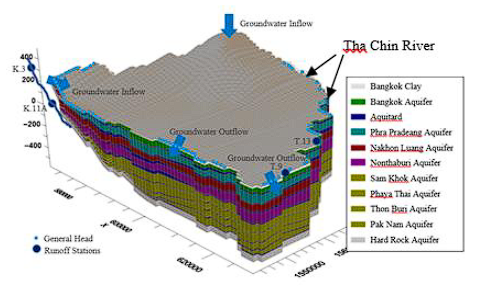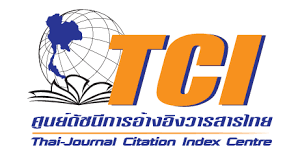Impacts of the 2011 Thailand Flood on Groundwater Recharge Potential in Flood Retention Area in the Middle Reach of Tha Chin River
doi: 10.14456/mijet.2022.24
Keywords:
The 2011 Thailand flood, flood retention area, groundwater recharge potential, Tha Chin RiverAbstract
The non–structural flood control measures under concept of “room for the river” were addressed and contained in the national master plan of flood management of Thailand due to unprecedented flooding occurrence in 2011. Some specific areas particularly in the upper and lower east of the Phanom Thuan, Song Phi Nong, and Bang Len Operation and Maintenance Projects in the middle reach of Tha Chin River were assigned as large flood retention area to retain excessive floodwater and reduce flood peak from the Chao Phraya and Tha Chin River Basins. Consequently, this study aims to explore the potential of groundwater recharge in the assigned flood retention area due to the 2011 Thailand flood. Groundwater flow modelling was then carried out and 4 scenarios of assigned flood stages of 0.50 m, 0.80 m, 1.50 m, and 2.00 m above the land surface were then simulated. The increase in hydraulic heads was investigated and compared with the spatial distribution of groundwater recharge rates done by WetSpass model in the same area. The results show that groundwater recharge potential in flood retention area along the right bank of the Tha Chin River is definitely low due to inappropriateness of hydro–geologic properties and high thickness of clay soil. In addition, the effects of downslope topography on local hydraulic gradient would influence the direction of groundwater flow discharging into the Tha Chin River and adjacent area. The simulated results performed by WetSpass model also show that average groundwater recharge rate in critical flood year in 2011 is 198.54 mm which is quantified as 19.43% of average annual rainfall. Moreover, the lowest value of average groundwater recharge rate is found especially in the lower east of Bang Len Operation and Maintenance Project which is considered as the assigned flood retention area.
References
N. Poaponsakorn and P. Meethom, "Impact of the 2011 floods and flood management in Thailand," ERIA Discussion Paper Series, ERIA–DP–2013–34, 2013.
Global Water Partnership, "The 2011 Thailand floods in the Lower Chao Phraya River Basin in Bangkok Metropolis," Stockhome, Sweden, 2017.
E. L. Gale and M. A. Saunders, "The 2011 Thailand flood: climate causes and return periods," Weather, vol. 68, no. 9, pp. 233–237, 2013.
P. Promchote, S. Y. Simon Wang and P. G. Johnson, "The 2011 great flood in Thailand: diagnostics and implications from climate change," Journal of Climate, vol. 29, pp. 367–379, 2016.
P. Teerapunyapong, Y. Phankamolsil, A. Rittima, Y. Talaluxmana and A. S. Tabucanon, "Estimation of groundwater recharge using WetSpass model in the Phanom Thuan–Song Phi Nong–Bang Len Operation and Maintenance Projects, Thailand," 22nd IAHR–APD Congress, Sapporo, Japan on September 15–16, 2020.
A. Lukjan, T. Chalermyanont and N. Riyapan, "Evaluation of groundwater safe yields of Hat Yai Basin using a mathematical model," 17rd National Convention on Civil Engineering, Centara Convention Center Hotel, Udorn–Thani, Thailand on May 9–11, 2012.
S. Rantasewee, A. Rittima, Y. Phankamolsil and Y. Talaluxmana, "Groundwater flow modelling for the development of managed aquifer recharge scheme in irrigation projects, Thailand," 3rd World Irrigation Forum (WIF3), Bali, Indonesia on September 1–7, 2019.
Geo–Informatics and Space Technology Development Agency (GISTDA), Thailand, 2011,https://www.qsl.net/rast/text/flood.html Accessed by 2021.
Silpakorn University, "Flood information service for flood warning in Nakhon Pathom 2011," Nakhon Pathom, 2011.
O. Batelaan and D. F. Smedt, "GIS–based recharge estimation by coupling surface–subsurface water balances," Journal of Hydrology, vol. 337, no. 3–4, pp. 337–355, 2007.

Downloads
Published
How to Cite
Issue
Section
License

This work is licensed under a Creative Commons Attribution-NonCommercial-NoDerivatives 4.0 International License.








